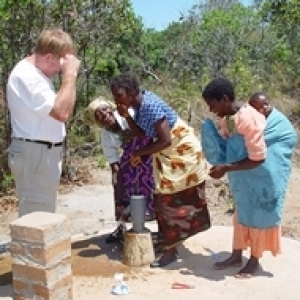Horticulture Class
4th February 2017:
Benidicto, head of Horticulture at the factory site, is here giving a lesson to our Form 4 girls on compost making, green manure plants and how to grow maize without, hugely expensive, chemical fertiliser.
With him are prominence and Miriam, two of our Saturday teachers.
We have just began a project for educating our girls in food production by integrating into the Secondary school curriculum, in our Centre for Learning garden.
Over 60 percent of our students will return to rural areas to farm after their MSCE exams rather than Third Level or University. And it is especially important for young girls to learn these skills to give them food and financial security in rural areas wherever they will finally settle.
For the past ten years, Wells for Zoë have been farming using no artificial fertilizers, noxious chemicals or genetically modified seeds and undertaking a kind of back to nature Conservation/Organic Farming approach
We fully realize that Malawi needs more food but see that more food does not require depleting or damaging the main resourcs, the land. We enlist two main agricultural technologies: minimum tillage and using post-harvest crop residues for fertilizer and crop protection. Minimum tillage provides many benefits for poor farmers including reduced labor costs and decreased soil erosion.
We use nitrogen fixing plants everywhere.
Much of our work is done with women, who make up to 80 percent of small scale farmers in sub-Saharan Africa. Projects that prioritize the needs of women are key in promoting food security in this region. Currently, only 10 percent of international donor funding is directed at women farmers. From access to credit to knowledge sharing of low-cost innovations, improving the income of women farmers translates to better nutrition for families.
If anyone out there can help with low cost organic innovations we would be most grateful
- 1
- 0
- Nikon COOLPIX AW120
- 1/1000
- f/2.8
- 4mm
- 125

Comments
Sign in or get an account to comment.


